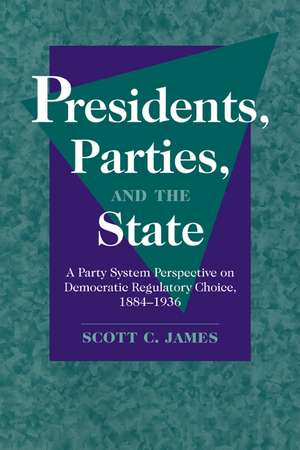Presidents, Parties, and the State: A Party System Perspective on Democratic Regulatory Choice, 1884–1936
Autor Scott C. Jamesen Limba Engleză Paperback – noi 2006
| Toate formatele și edițiile | Preț | Express |
|---|---|---|
| Paperback (1) | 288.62 lei 43-57 zile | |
| Cambridge University Press – noi 2006 | 288.62 lei 43-57 zile | |
| Hardback (1) | 555.45 lei 43-57 zile | |
| Cambridge University Press – 23 iul 2000 | 555.45 lei 43-57 zile |
Preț: 288.62 lei
Nou
Puncte Express: 433
Preț estimativ în valută:
55.23€ • 57.82$ • 45.70£
55.23€ • 57.82$ • 45.70£
Carte tipărită la comandă
Livrare economică 07-21 aprilie
Preluare comenzi: 021 569.72.76
Specificații
ISBN-13: 9780521030021
ISBN-10: 0521030021
Pagini: 320
Ilustrații: 7 b/w illus. 31 tables
Dimensiuni: 152 x 228 x 18 mm
Greutate: 0.47 kg
Editura: Cambridge University Press
Colecția Cambridge University Press
Locul publicării:New York, United States
ISBN-10: 0521030021
Pagini: 320
Ilustrații: 7 b/w illus. 31 tables
Dimensiuni: 152 x 228 x 18 mm
Greutate: 0.47 kg
Editura: Cambridge University Press
Colecția Cambridge University Press
Locul publicării:New York, United States
Cuprins
Acknowledgments; 1. Introduction: parties, presidential elections, and regulatory choice - a party system perspective; 2. Swing states, business Mugwumps, and the Interstate Commerce Act of 1887; 3. The Progressive party vote and the Federal Trade Commission Act of 1914; 4. Progressive Republicans and the 'Death Sentence' for public utility holding companies during America's second New Deal; 5. Conclusion: parties and the American regulatory state; Bibliography; Index.
Recenzii
"Scott James combines impeccable historiography with first-rate political analysis to discover the brass ring of turn of the century American congressional politics--winning control of the presidency. This thoroughly political, highly strategic account offers a convincing rationale for understanding this critical era of America's political development." Samuel Kernell, University of California, San Diego
"...sensitivity to contingency makes James' study excellent history as well as important political science...It is this careful attention to historical context and individual action that makes this fresh "perspective" on policy history so valuable in comparison with more rigid institutionalist and rational-choice approaches to the subject." James J. Connelly, Journal of Interdisciplinary History
"James resolves a great paradox in American state development, explaining why a rabidly anti-state party chose to use its moments in power to help build the state. His analysis of strategic imperatives facing the Democrats in the presidential elections of the industrial era opens onto a synthetic reinterpretation of considerable range and power." Stephen Skowronek, Yale University
"In Presidents, Parties and the State, Scott James offers a fresh, original, and convincing account of the development of some of the central parts of the progressive regulatory project. Neither a group-based nor new institutional account can adequately explain the passage of the Interstate Commerce Act, the creation of the Federal Trade Commission, or the politics of the Public Utility Holding Companies Act. Instead, a party systems perspective is needed, one that focuses on the attempt to form and hold national majorities, one that gives agency and leadership to the president, and one that, along the way, explains major changes of direction in party politics. It is an achievement to be able to say something so bold and persuasive about so important -- and heavily studied -- a period." John H. Aldrich, Duke University
"...sensitivity to contingency makes James' study excellent history as well as important political science...It is this careful attention to historical context and individual action that makes this fresh "perspective" on policy history so valuable in comparison with more rigid institutionalist and rational-choice approaches to the subject." James J. Connelly, Journal of Interdisciplinary History
"James resolves a great paradox in American state development, explaining why a rabidly anti-state party chose to use its moments in power to help build the state. His analysis of strategic imperatives facing the Democrats in the presidential elections of the industrial era opens onto a synthetic reinterpretation of considerable range and power." Stephen Skowronek, Yale University
"In Presidents, Parties and the State, Scott James offers a fresh, original, and convincing account of the development of some of the central parts of the progressive regulatory project. Neither a group-based nor new institutional account can adequately explain the passage of the Interstate Commerce Act, the creation of the Federal Trade Commission, or the politics of the Public Utility Holding Companies Act. Instead, a party systems perspective is needed, one that focuses on the attempt to form and hold national majorities, one that gives agency and leadership to the president, and one that, along the way, explains major changes of direction in party politics. It is an achievement to be able to say something so bold and persuasive about so important -- and heavily studied -- a period." John H. Aldrich, Duke University
Descriere
James challenges dominant theories of regulatory politics by placing presidential elections and national party leaders at the centre of American regulatory state development.














